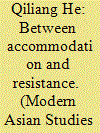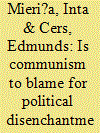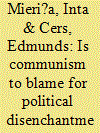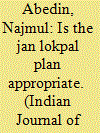| Srl | Item |
| 1 |
ID:
131798


|
|
|
|
|
| Publication |
2014.
|
| Summary/Abstract |
This paper examines the resistance of pingtan storytellers to Communist political domination and economic exploitation on the eve of the Cultural Revolution (1966-1976). In the early and mid-1960s, storytellers rarely mounted resistance through direct confrontations with the political authorities, but often in 'everyday forms' such as by libelling cadres, asking for sick-leave, refusing to conform to the dress code during performances, and threatening to withdraw from troupes. In order to vent their disappointment at the economic hardships following the Great Leap Forward (1958-1961), storytellers resorted to the flexible ways of narrating and performing pingtan stories to manipulate the storylines and characterizations in their stage performances. Hence storytellers engaged in counter-propaganda by telling ribald jokes and distorting stories that were originally designed to praise Communist revolutions. This investigation of the resistance of storytellers, both on and off stage, is intended not merely to raise a long overlooked history of the 1960s from oblivion, but also to highlight the Party-state's inability to ideologically transform Chinese artists prior to the Cultural Revolution.
|
|
|
|
|
|
|
|
|
|
|
|
|
|
|
|
| 2 |
ID:
135004


|
|
|
|
|
| Summary/Abstract |
This article adds to the literature explaining a rise in the levels of violence and intimidation against the Islamic sect Ahmadiyah in Indonesia. In contrast to approaches that stop at describing the actors or doctrinal differences involved, this article situates the anti-Ahmadiyah discourse in wider processes of maintaining or securing political and social authority. The author first describes how charges of heresy have historically served to consolidate state and political authorities. This analysis is then extended into the post-Soeharto landscape by showing how the charges of heresy against Ahmadiyah have supported fragments of the New Order state to claw back some of the authority lost after the 1998 political transition. Finally, the author situates this process in the context of increased competition among religious authorities. The implications of using such an approach are twofold: first, the Indonesian state's role in the conflict is not defined only by its absence but also by its active involvement; and second, understanding the rise of conservative ulama as part of a wider process of an increase in many different voices weakens the claim that Indonesia is becoming more religiously conservative. The more general conclusion is that the role of academic writing should be to contextualize contemporary discourses of heresy by revisiting some of the methods used in classic heresiology.
|
|
|
|
|
|
|
|
|
|
|
|
|
|
|
|
| 3 |
ID:
132938


|
|
|
|
|
| Publication |
2014.
|
| Summary/Abstract |
In this article, we apply a new, original technique of cohort analysis to test empirically whether political disenchantment in the post-communist countries of Central and Eastern Europe can be linked to the previous political culture. On the basis of International Social Survey Programme 1996 and 2006 data we find a surprisingly similar and unique cohort effect in all analysed post-communist countries, reflecting persistent generational differences in perceived political competence (interest and understanding of political processes). However, the communist legacy does not seem to be important for explaining low self-efficacy or distrust in political authorities and their responsiveness to citizens' demands.
|
|
|
|
|
|
|
|
|
|
|
|
|
|
|
|
| 4 |
ID:
133748


|
|
|
|
|
| Publication |
2014.
|
| Summary/Abstract |
In this article, we apply a new, original technique of cohort analysis to test empirically whether political disenchantment in the post-communist countries of Central and Eastern Europe can be linked to the previous political culture. On the basis of International Social Survey Programme 1996 and 2006 data we find a surprisingly similar and unique cohort effect in all analysed post-communist countries, reflecting persistent generational differences in perceived political competence (interest and understanding of political processes). However, the communist legacy does not seem to be important for explaining low self-efficacy or distrust in political authorities and their responsiveness to citizens' demands.
|
|
|
|
|
|
|
|
|
|
|
|
|
|
|
|
| 5 |
ID:
124501


|
|
|
|
|
| Publication |
2012.
|
| Summary/Abstract |
when ombudsman institution was first created in Scandinavia more than 200 years ago its main responsibilities were to redress general or ordinary grievances and complains of citizens against public bureaucracies / administration (not against public representatives) and to protect their rights and liberties against bureaucratic encroachment or maladministration. It was not intended to fight or investigate corruption or to look into the malpractices of the political authorities.
|
|
|
|
|
|
|
|
|
|
|
|
|
|
|
|